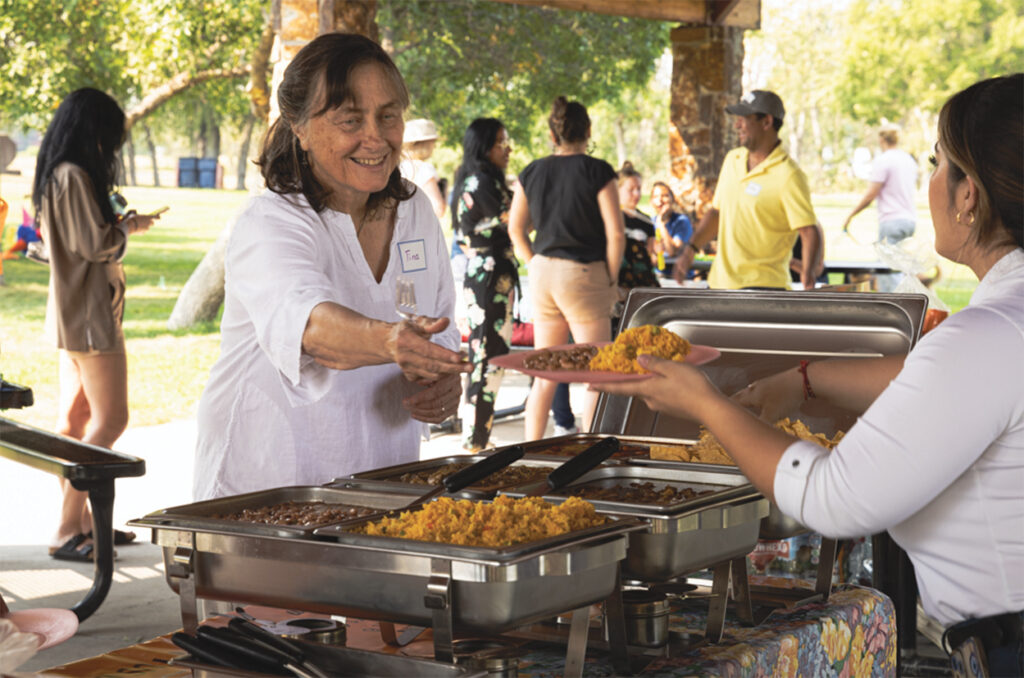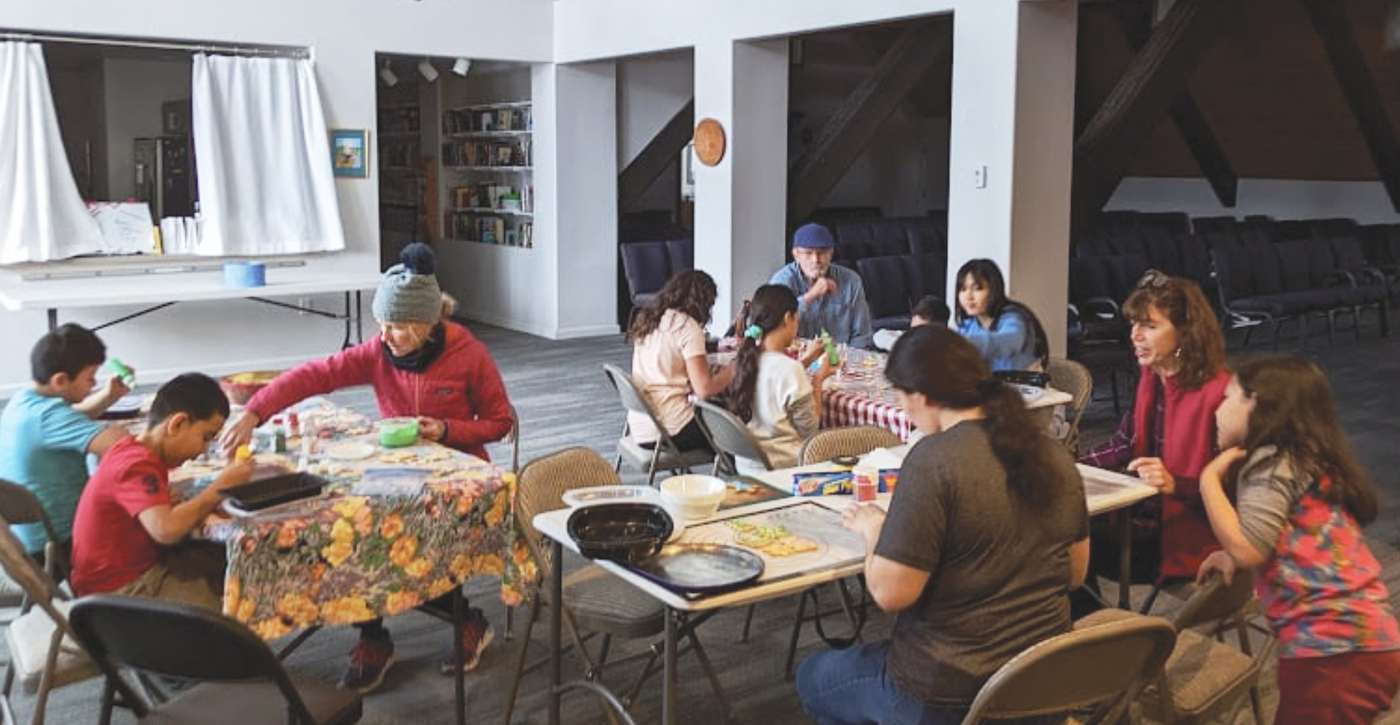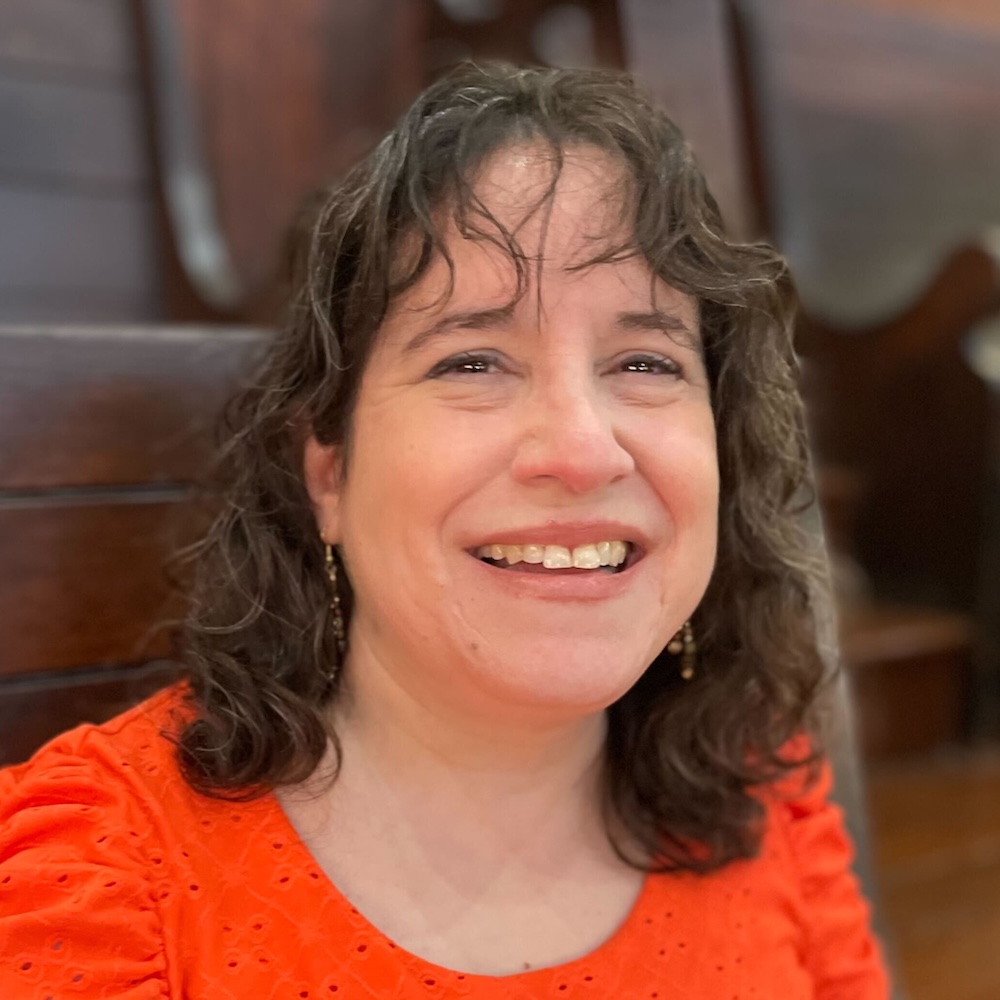An Interview with Tina Visscher on Her Leading to Welcome Migrants in Montana
Bienvenidos is a Montana-based organization that partners Spanish-speaking families, many of them from Honduras and Venezuela, with mentors who listen to their priorities and help them address their needs. The word bienvenidos is Spanish for “welcome.” Friends Journal staff writer Sharlee DiMenichi talked with one of the founders, Tina Visscher, a member of Montana Gathering of Friends Meeting, who served as the first director of Bienvenidos from February 2020 through May 2024. The interview has been lightly edited.
Sharlee DiMenichi: Please give an overview of your role in Bienvenidos and explain how it got started.
Tina Visscher: Bozeman Worship Group is a small worship group under the care of Montana Gathering of Friends Meeting. There were probably five people there for a business meeting in fall of 2019, and one of the members said, “I would really like to do something locally, social-justice wise.” About three days later, we heard about the influx of immigrants into the Bozeman community.
The local school district’s English-learner coordinator, Ellen Guettler, met with us and was just overwhelmed. Suddenly there were 75 kids that spoke Spanish. She was the coordinator of the program, but nobody else was helping her. The new arrivals were wearing flip flops and had no winter clothing. We said, “Great, we’ll find some winter clothing.” Two other volunteers (Heather Jackson and Peter Husby) and I hustled around all these thrift stores and bought jackets and mittens. It had already started snowing in October.
We set up 17 bags, and my husband, Tim, delivered them all. I thought maybe a mentorship program would be good to help people adjust to living in the community. In February 2020 the mentorship program began. We matched, I think, eight families at first. I made three-ring resource binders for the mentors—very old school.
The COVID shutdown happened, but we learned about Zoom. We kept training volunteers and kept adding families. I think it’s up to like 55 families now. I was the director. For a long time, I was doing the orientations, doing the match meetings, all of the things early on. Then another volunteer came on board and started helping. Then a small group of us decided to become a nonprofit. We now have a full-time director who started a year ago.
SD: When you were the director were you volunteering or were you on staff?
TV: I was a volunteer. There was no money to pay for a staff director’s position. I had a zippered bank envelope and occasionally people would give me cash. If a volunteer had an emergency, I would give them cash from the envelope.
Once we became a nonprofit, we kept bringing more volunteers in and matching more families. We got a grant to hire a resource coordinator in Big Sky. We now have a program manager and a director. It’s been meteoric, wow. The chair of the board, Mayra Del Carmen, is a Hispanic woman from California, the daughter of a farm worker and a meat packer. She’s a new professor at Montana State University. The director, Vanessa Zamora, is from Colombia.
SD: When you volunteered as the director, what was a typical day of that work like for you?
TV: One of the things we did was get together all the organizations and agencies in town. Every two weeks we met as the Migrant Community Coordination Group to solve problems and to put pressure on organizations to have language access systems that work.
The hospital was probably the biggest organization to shift; that has grown and expanded. Before our work, people were getting instructions for surgery, the instructions of how you take care of yourself, in English only. Now we also have language access in the courts. We have it at all the clinics. At the beginning, nobody could make a phone call because there would be no way for them to get an interpreter.
Part of my job would be reaching out to the homeless shelter, putting pressure on them—they weren’t taking people because they couldn’t do a background check. Then they figured out if they just got references on the family from an organization that had known them for at least a month, they would start taking them.
I’m a clinical social worker. I have a background both in the big and the individual points of view. So that was the big part. The little part was talking to new volunteers and getting together the orientations. About a year ago we hired a consultant to help us with cultural appropriateness and an empowerment basis, so that we’re not creating dependency. I would go on visits with my husband, who is fluent in Spanish. I would take kids to the library. I took two kids to the symphony.
SD: Which Quaker values guided the formation of the organization?
TV: Certainly there’s that of God in everyone. Advocacy in the community for equality, equal access, and respect. A lot of people have commented that it was an opportunity to actually do something. I’m a social worker and a Quaker. I know the value of real, long-term relationships and action.

SD: What qualities should mentors have?
TV: I can tell you what I don’t look for: people who want to come in, take over, and take control. We really fostered listening and following the lead of the family. We emphasize the importance of developing relationships, listening, and being curious.
The other thing that I tried to impart to the mentors was to tell the families about yourself. This is not a one-sided relationship; it’s not a case manager sent out from an agency. You are a friend and neighbor. The program is called the partner program. We try to keep that in mind.
Everything was done in teams. Each mentor was partnered with another mentor. So part of the experience was being able to work together and to reach out for help when you’re feeling overwhelmed, powerless, or anxious. There was a legal team and an immigration team—all the things were teams all along. Teamwork was a core value.
SD: How many Quakers have been involved in the organization over the years?
TV: Heather Jackson and I were the founders, along with a few other non-Quakers. Peter Husby was also instrumental. Three Quakers have been mentors.
SD: How have the needs and concerns of immigrant families changed under the current presidential administration?
TV: Because I worked with kids and families, my first thought was, If the parents are deported, what’s going to happen? The school district has almost 600 Spanish-speaking students now. There were 75 when we started, wow. My husband and I have mentored a woman who has six kids, and she has an order of removal. Three of them are U.S. citizens, but what if she gets deported? These are people we know really, really well.
The American Civil Liberties Union came out with some recommendations right away for family preparedness plans. All through last fall, we were working on getting that information out to families and training mentors to sit down with families to appoint guardians. They have to tell their kids what to do if they get home from school and nobody’s here or if the parents don’t get home from work. That’s just a terrible, heartbreaking thing. Also you’ve got little kids who you can’t explain it to. So that was my biggest focus. We got the information out to the organizations and agencies that were asking for help and guidance from us. I’m going to start talking to family services about maybe training some families to be foster parents.
SD: How would you describe the spiritual aspect of this work?
TV: It felt like a joy, a leading, and a passion the whole time. For the first few years, we were under the care of my monthly meeting, which is Montana Gathering of Friends Monthly Meeting. We had a lot of donations coming in from Quakers at first. We were under their care, so I was reporting to them, and then when it became a nonprofit, in November 2021, it kind of moved out of Quaker hands.
The growth of it, the response of the community, the time period—during COVID and the first Trump presidency—it was just very heartening to see people giving of themselves and wanting to volunteer.
It is important to realize that immigrants are really resilient. They will solve their own problems. You don’t need to pop in and be the White rescuer. I had studied a lot about White privilege. White people can know that they do have White privilege and they do have power, instead of trying to pretend they don’t. Bienvenidos put into action a lot of other parts of my social worker self. So for me, personally, it was really a growth experience. I felt both blessed by it, but also in some deep sense, not really responsible for it. I could not have done this if this wellspring of goodwill had not swept along with it.





A wonderful article about what has become a very well organized and effective community service in a very short period of time thanks mostly to the insight and energy of Tina. I have been a volunteer with Bienvenidos and have gotten at least as much from the program as our Honduran families have.